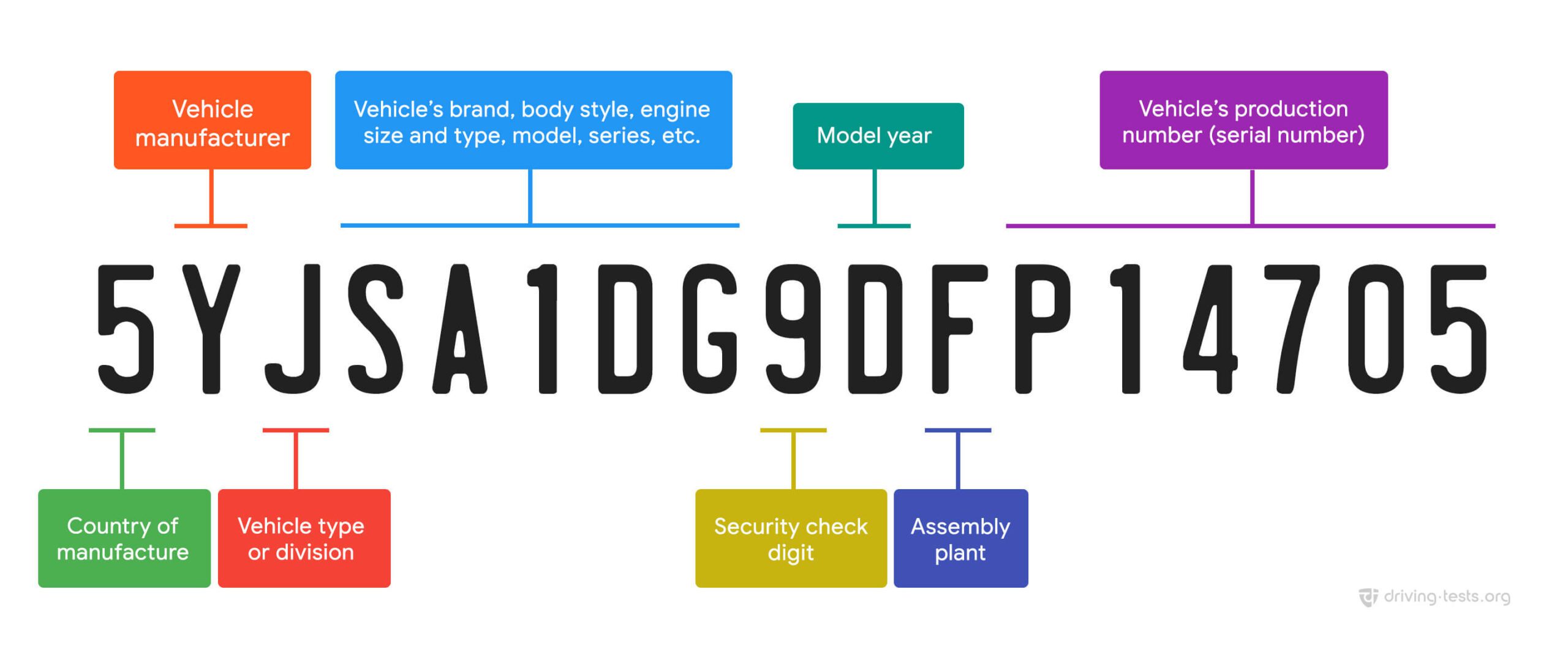Before you buy a used car, there are a few ways to get a free VIN check.
Each vehicle receives a Vehicle Identification Number (VIN). By looking up that number, you can find the car’s state registrations, title type and whether anyone has filed an insurance claim on the car after an accident.
There are several free options for getting a VIN verified. If you’re interested in learning more about your current vehicle before buying it, you can even buy one.
Introduction
The car industry is a vast and complex field, with many different components and systems that work together to make a vehicle function properly. One of the vehicle’s most important components is the Vehicle Identification Number or VIN.
People use this unique code to identify a specific vehicle for various purposes, including registration, insurance and even tracking down a stolen vehicle.
What is a vehicle identification number (VIN)?
A VIN is a 17-digit code that is unique to each vehicle. It is made up of letters and numbers and can be found on various parts of the vehicle, including the dashboard, door jamb, and engine.
The VIN is used to identify the vehicle’s make, model, year, and other important information such as the engine size and transmission type.
Importance of VIN in the Car Industry
VIN is incredibly important in the car industry for various reasons. First and foremost, people use it to identify a specific vehicle and ensure proper registration and insurance. This is crucial for both the consumer and the manufacturer because it ensures legal road use and protects the consumer in case of an accident.
Additionally, people also use the VIN to track the vehicle’s history, including any accidents or repairs. This information is incredibly valuable to both consumers and car dealers, as it can help to determine the value of a used vehicle and ensure that the consumer is getting a fair deal.
How is VIN Assigned?
The manufacturer assigns the VIN when producing the vehicle. Each manufacturer has a unique identifier included in the VIN. This ensures that no two vehicles have the same VIN, which helps to prevent fraud and other issues.
Several free VIN verification options include the National Insurance Crime Bureau (NICB), VehicleHistory.com, and iSeeCars.com/VIN. You should visit more than one of these websites to obtain a complete picture of the vehicle’s history.
How VIN is Used in Stolen Vehicle Recovery
VIN is used to track a vehicle in case it is stolen. Police use the VIN to identify the vehicle and track it down. VIN is a unique number engraved on various parts of the vehicle, and it can be used to match the stolen vehicle with the one recovered by the police.
Where can I find the VIN?
Outside the car, check for the VIN on the dashboard on the driver’s side or a label on the door jamb of the driver’s door. The vehicle identification number (VIN) is inscribed on the title, registration, and insurance documents.
VIN Decoding: Understanding the Complexities of Vehicle Identification Numbers
If you’re in the market for a used car, you’ve probably heard the term “VIN decoding” thrown around a lot. But what exactly does it mean, and why is it so important? In this article, we’ll dive deeply into VIN decoding and explain everything you need to know to make an informed decision when buying a used vehicle.
A Vehicle Identification Number (VIN) serves as a sort of “fingerprint” for a vehicle. It contains a wealth of information about the car, including its make, model, year, engine size, and more.
The Different Sections of a VIN
A VIN is made up of several different sections, each of which contains specific information about the vehicle. Here’s a breakdown of the most important sections:
- World Manufacturer Identifier (WMI) – This section of the VIN contains the first three digits and tells you the country where the vehicle was manufactured, as well as the manufacturer of the vehicle.
- Vehicle Attributes – The next five digits of the VIN tell you more about the vehicle, including its body style, engine type, and transmission.
- Vehicle Identifier Section (VIS) – The next six digits of the VIN make up the VIS and contain even more specific information about the vehicle, such as its model, trim level, and production numbers.
- Check Digit – The ninth digit of the VIN is a check digit that ensures correct VIN entry.
- Model Year and Plant Code – The tenth digit of the VIN tells you the vehicle’s model year and the eleventh digit indicates where the manufacturer made the vehicle.
- Production Sequence Number – The final six digits of the VIN make up the production sequence number that tells you the specific order in which the manufacturer built the vehicle.
The VIN Decoding Process
Now that you know what each section of a VIN contains, you might wonder how to decode a VIN. The process is simple – only the VIN and a VIN decoder tool. Many such tools are available online; all you have to do is enter the VIN and hit “decode.” The tool will then give you a wealth of information about the vehicle, including its make, model, year, engine size, and more.
Why is VIN Decoding Important?
VIN decoding is important for several reasons. For one, it can help you identify a specific vehicle, which is essential when buying a used car. It can also help you determine the vehicle’s value and can even reveal whether it has been in an accident or has been reported stolen.
In conclusion, VIN decoding is a valuable tool for anyone in the market for a used vehicle. By understanding what a VIN is, what information it contains, and how to decode it, you can make an informed decision when buying a car and ensure that you’re getting a vehicle that meets your needs and fits your budget.
VIN Verification: Why It’s Important for Car Buyers
Verifying the Vehicle Identification Number (VIN) is essential when buying a used car. Every vehicle manufactured since 1981 has a unique 17-digit code called a VIN, which functions as a “fingerprint” for the car. Verifying the VIN allows you to ensure that you are receiving precisely what the advertisement states, and it can help you avoid any possible issues in the future.
Methods for Verifying a VIN
There are several methods for verifying a VIN, including:
- Checking against government databases – Many government agencies, such as the National Highway Traffic Safety Administration (NHTSA) and the Department of Motor Vehicles (DMV), maintain databases of VINs and can verify the information associated with a specific VIN.
- Physical inspection – A physical inspection of a vehicle can also be used to verify a VIN. This includes checking the VIN on the car against the VIN on the title and looking for signs of tampering or alteration on the VIN plate.
- VIN decoder tool – Online VIN decoder tools can also verify a VIN. These tools can provide a wealth of information about the vehicle, including its make, model, year, engine size, and more.
Potential Issues with VIN Verification
While VIN verification is an important step in the car buying process, there are potential issues to be aware of. One of the biggest is that VINs can be altered or tampered with, making it difficult to verify the information associated with a specific VIN. Additionally, some sellers may use a VIN from a different vehicle to sell a car, which can lead to major problems down the road.
Avoiding Issues with VIN Verification
To avoid issues with VIN verification, it’s important to be vigilant when buying a used car. This includes checking the VIN against government databases, performing a physical vehicle inspection, and using a VIN decoder tool to verify the information associated with a specific VIN. Additionally, it’s a good idea to have a trusted mechanic inspect the vehicle before buying it, as this can reveal any potential issues that might not be immediately obvious.
VIN verification is an essential step in the car-buying process. By understanding the importance of VIN verification, the different methods for verifying a VIN, and the potential issues to be aware of, you can make an informed decision when buying a used car and avoid potential problems down the road.
VIN Cloning: What You Need to Know
VIN cloning is a growing problem in the automotive industry. It occurs when a criminal uses a legitimate vehicle’s VIN (Vehicle Identification Number) and assigns it to a different, often stolen, vehicle. This allows the criminal to conceal the true identity of the stolen vehicle and sell it as a legitimate one.
Consequences of VIN Cloning
VIN cloning can have serious consequences for both car buyers and sellers. For buyers, it can mean purchasing a vehicle with a hidden past, such as a salvage title or outstanding liens. This can lead to financial losses and legal issues down the road. For sellers, it can mean unknowingly selling a stolen vehicle, leading to legal problems and damaging their reputation.
Detecting and Preventing VIN Cloning
To detect and prevent VIN cloning, it’s important to be vigilant when buying or selling a vehicle. This includes:
- Checking the VIN against government databases, such as the National Highway Traffic Safety Administration (NHTSA) and the Department of Motor Vehicles (DMV), to ensure that the vehicle is legitimate.
- Performing a physical inspection of the vehicle to check for signs of tampering or alteration on the VIN plate.
- Using a VIN decoder tool to verify the information associated with a specific VIN.
- Having a trusted mechanic inspect the vehicle before buying or selling it can reveal any potential issues that might not be immediately obvious.
It’s also important to be aware of red flags when buying or selling a vehicle, such as a suspiciously low price or a seller unwilling to provide a complete vehicle history report.
VIN cloning is a serious problem in the automotive industry that can have serious consequences for both car buyers and sellers. By understanding what VIN cloning is, the consequences of it, and how to detect and prevent it, you can protect yourself from becoming a victim of this crime. It’s important to be vigilant when buying or selling a vehicle and to always verify the information associated with a specific VIN.
Free VIN Check Online: What You Need to Know
If you plan to buy or sell a used car, check its vehicle identification number (VIN) first. A free VIN check online can help you learn more about a car’s past and present, such as:
- Historical events: You can see if the car has been involved in any accidents, thefts, floods, fires, or other incidents that may affect its value or safety.
- Auctions and incidents: You can find out if the car has been sold at any auctions or reported as a total loss, salvage, junk, or lemon by insurance companies or other authorities.
- Historical sales listings: You can compare the car’s current price with its previous sale listings at different mileage levels to see if it is fair or overpriced.
- NHTSA recalls and complaints: You can check if the car has any open recalls or safety issues that need to be fixed by the manufacturer or dealer. You can also see what other owners have complained about regarding the car’s performance or reliability.
- Vehicle specifications: You can verify the car’s make, model, year, engine type, transmission type, body style, colour, and other details to make sure they match with what the seller claims.
Many websites offer free VIN check online services.
Some of them are:
- Vehicle History: This website provides comprehensive and up-to-date reports on any VIN for free. It also has useful features such as used vehicle reviews, top-rated vehicles, latest articles on common problems and solutions for different models and years of cars.
- VinGurus: This website allows you to check a VIN entirely for free. It also gives you access to a database of millions of vehicles for sale nationwide with detailed descriptions and photos.
- NHTSA: This is the official website of the National Highway Traffic Safety Administration (NHTSA), which regulates vehicle safety standards in the United States. It lets you decode any VIN and see if it has any open recalls or defects that need to be addressed by the manufacturer or dealer.
A free VIN check online can save you time and money when buying or selling a used car. It can also help you avoid scams and fraud by giving accurate and reliable information about a vehicle’s history and condition. However, it is essential to remember that a free VIN check online is not a substitute for a professional inspection by a mechanic or an expert before making a final decision.
Best Free VIN Check 2026
There are many websites that offer VIN check services, but not all of them are free or reliable. Some may charge you a fee or provide incomplete or outdated information. To help you find the best free VIN check websites of 2026, we have compiled a list of the top seven options based on their features, accuracy, and user reviews.
- National Insurance Crime Bureau (NICB)
- VehicleHistory.com
- iSeeCars.com/VIN
- Vehicle History – Best Free VIN Check Overall, Vehicle History is one of the best free VIN check websites that provides much information for free1. It offers a full VIN decoding feature, all the public sales records they can find, all open recalls, and even pictures of the actual vehicle if available. The information is accurate but may be outdated as it only includes publicly available data. There is no option for a comprehensive report on this website.
- Mechanic Base VIN Lookup – Our Free VIN Decoder Mechanic Base is developing the best free VIN check site here on Mechanic Base. You can try it now for free and get the essential information about any vehicle. It gives you an easy-to-use interface and does not push you to purchase anything to get more information. However, in the future, they will also add features to get a full vehicle history report.
- NICB – Best Free VIN Check for Theft and Total Loss Records The NICB (National Insurance Crime Bureau) is one of the best places to obtain a free VIN check for theft and total loss records. This platform can help you check if a vehicle has been reported as stolen or declared a total loss by an insurance company. It is very easy to use: enter the VIN, agree to the terms, and complete the captcha. Then you will see the result of your VIN search.
- CarFax – Best Free VIN Check for Recall Information CarFax is another of the best free VIN checkers that provide valuable in-depth information about any used vehicle. They use the VIN to identify any reports of theft, import information, previous damage or accidents, mileage manipulations, and much more. However, not all of this information is available for free. You can only access recall information for free on this website by entering your email address and VIN.
- AutoCheck – Best Free Alternative to CarFax AutoCheck is another popular website that offers similar services as CarFax but at a lower price point. You can get a single report for $24.99 or unlimited reports for $49.99 within 21 days. However, you can also get some basic information for free by entering your license plate number instead of your VIN on this website. You will get details such as year, make, model, body style, and engine type for free on AutoCheck.
- iSeeCars – Best Free Vin Check Website with Visual Analysis iSeeCars is another excellent website offering many valuable features for car buyers and sellers alike. One of them is their visual analysis tool that allows you to compare different vehicles based on their price, mileage, condition, features, and ratings using graphs and charts. You can also get a free market value analysis report that shows you how much your car is worth based on its condition and market demand. To access these features, you must enter your email address, license plate number, or ZIP code on this website.
- VinAudit – Best Cheap Alternative to CarFax and AutoCheck VinAudit is another website that offers comprehensive vehicle history reports at a fraction of the cost of CarFax and AutoCheck. You can get a single report for $9.99 or unlimited reports for $19.99 within 30 days. Their reports include title history, odometer readings, accident history, salvage records, and theft records. For free, you will get details such as year, make, model, body style, and engine type on VinAudit. You can also get some basic information for free by entering your VIN on this website.
These are some of the best free VIN check websites of 2026 that you can use to get reliable and accurate information about any vehicle. However, only VIN check websites can provide 100% complete and up-to-date information. Therefore, inspecting the car in person and verifying the information with the seller before purchasing is always advisable.
Here’s Where To Get a Completely Free VIN Check!
There are several websites where you may get a used car VIN check, free VIN checks, free VIN checks, iSeeCars VIN checks, and a free car report before buying a secondhand car.
A VIN check is essential if you’re buying a car on Craigslist or eBay since you won’t be dealing with a dealership that can provide free access to paid services like CARFAX, iseecars.com/vin, AutoCheck, or autoDNA.com.
The National Insurance Crime Bureau (NICB), VehicleHistory.com, and iSeeCars.com/VIN provide free VIN checks. Input your vehicle’s VIN; these sites will perform a VIN lookup and give you vehicle information.
However, you should visit more than one of these websites to obtain the complete picture.
iSeeCars
So far, iSeeCars‘ award-winning technology for searching used cars and finding the best offers has saved customers $329,952,383.
They scrutinize every ad to prevent overpayment and grade each dealer to avoid taking advantage. MITX named it one of the “Best Consumer Technology that Makes Life Easier.”
Another free VIN check option is iSeeCars. iSeeCars’ free vehicle history report covers the following 200 data points:
- Analysis of the cost
- History of prices
- Expect depreciation
- When should you buy it, and when should you sell it?
Vehicle History
Vehicle history is a free alternative for a more comprehensive VIN lookup that includes information such as fuel efficiency, the cost to own, and pricing analysis.
This free VIN lookup will also provide you with the following information:
- Selling history.
- A detailed list of the manufacturer’s warranties that are about to expire.
- Recall current information.
- Price forecasts for the ideal time to buy a specific make and model.
Enter your car’s VIN under the “Research” link on the homepage to obtain your free VIN report from vehicle history. Then select “View Report” from the drop-down menu.
National Insurance Crime Bureau
The National Insurance Crime Bureau (NICB.org) keeps things simple with its VIN check search engine. The webpage free auto VIN free VIN check report check will inform you whether your car has:
- Reported as stolen or lost.
- Salvaged.
- Following a collision, the vehicle was declared a total loss.
- This is the most basic of the 100% free VIN checks available, and each IP address is restricted to five searches each 24 hours.
To obtain your report, go to the website and input your vehicle’s VIN in the “Look Up a VIN” field. After agreeing to the terms and conditions and confirming that you are not a robot, click “Search VIN.”
The VIN check results will then be shown.
What if my VIN doesn’t decode?
Ensure you accurately copied all 17 of the VIN’s number and letter combinations. Check for the letters O (o), I I, and Q (q) (q). These letters are not included in the conventional format to avoid confusion with the digits 0, 1, and 9).
How To Decode Your VIN
VINs come in two lengths: 17 and 11 characters. Every vehicle on the road today has a specific VIN.
A VIN may appear to be a worthless collection of digits, but it can be decoded with a few keystrokes.
- Your VIN’s first letter denotes the nation of origin.
- The second and third letters indicate manufacturer and division.
- The fourth to eighth letters represent the vehicle’s description, safety, and engine type.
- The manufacturer’s security code is the ninth letter.
- The vehicle’s model year is indicated by the tenth letter.
- The assembly plant identity is the 11th letter.
- Letters 12-17 represent plant sequential number/vehicle serial number.
Who needs a vehicle report?
Selling your car? Get a vehicle history record for buyers. A vehicle history report is primarily for used car buyers and dealers. If you’re looking to buy a used car, you should check the VIN to ensure it hasn’t had any significant problems.
What does a free vehicle history report include?
The VinCheck.info free vehicle history report is a 10-page document that compiles crucial information about a used vehicle from industry and government sources. It shows a used automobile’s historical and current condition, including vehicle characteristics, equipment data, and the NMVTIS Report.
It also has value-added elements, including market value, fuel economy, safety rating, inspection checklist, recalls and problems, and information on vehicle insurance. Free VIN report.
How to Buy a Used Car in 10 Steps
- What kind of vehicle can you afford?
- Make a list of used vehicles that you want to buy.
- Compare prices.
- Look for used cars for sale in your neighborhood.
- Get a copy of the vehicle’s history report.
- Make contact with the vendor.
- Take a test drive in the vehicle.
- Get the car examined.
- Work out a decent bargain.
- Finish the papers.
How to Get a Free Carfax Report
Look for free CARFAX Reports while browsing a dealer’s used car inventory. If a link isn’t working, contact the dealer and get a CARFAX report. Many vehicle dealerships in your region provide free CARFAX reports. Inquire when you visit the dealer’s showroom.
Conclusion
The VIN is an incredibly important component of any vehicle. VIN identifies vehicles, ensures registration and insurance, tracks history, and recovers stolen vehicles. Car owners must be aware of their vehicle’s VIN and keep it on file for reference in emergencies.
FAQs
What is a VIN,, and Why is it Important?
A VIN is a 17-digit code that is unique to every vehicle. It is used to identify a specific vehicle and contains information such as the manufacturer, model, year, and engine type. VINs are important because they provide a way to track a vehicle’s history, including any accidents, repairs, and service records. This helps you decide on a used car’s condition and value.
How do I Decode a VIN?
Decoding a VIN is relatively easy, but it can be tricky if you’re unfamiliar with the format. VIN has three sections: the World Manufacturer Identifier (WMI), the Vehicle Attributes Section (VAS), and the Vehicle Identifier Section (VIS).
The WMI is the first three characters of the VIN and identifies the manufacturer and country of origin. The VAS is the next six characters and contains information about the vehicle’s body style, engine type, and other features. VIS has 8 characters and shows the production number and model year.
To decode a VIN, you can use a VIN decoder tool, which can be found online. Enter the VIN, and the tool will provide you with all the information.
How Can I Verify a VIN?
Verifying a VIN is important to ensure that the vehicle you are considering purchasing is not stolen or counterfeit. One way to verify a VIN is to check it against the vehicle’s registration or title. Check VIN with NICB or NHTSA databases.
Another way to verify a VIN is to have a professional mechanic inspect the vehicle. They can check the VIN against the vehicle’s body and engine to ensure they match.
What is VIN cloning and how to prevent it?
VIN cloning is using a legitimate VIN from one vehicle and applying it to another. This hides a vehicle’s identity or history for selling stolen or salvaged ones.
It’s important to be vigilant when buying a used car. Make sure to verify the VIN against the vehicle’s registration or title, and have a professional mechanic inspect the vehicle. Check VIN against government databases for theft or salvage.
What Should I Do if I Suspect VIN Cloning?
If you suspect a vehicle’s VIN has been cloned, it’s important to report it to the authorities. You can contact the NICB or the NHTSA and provide them with the VIN and other information about the vehicle.










